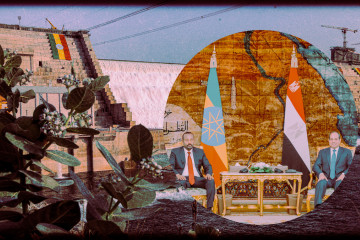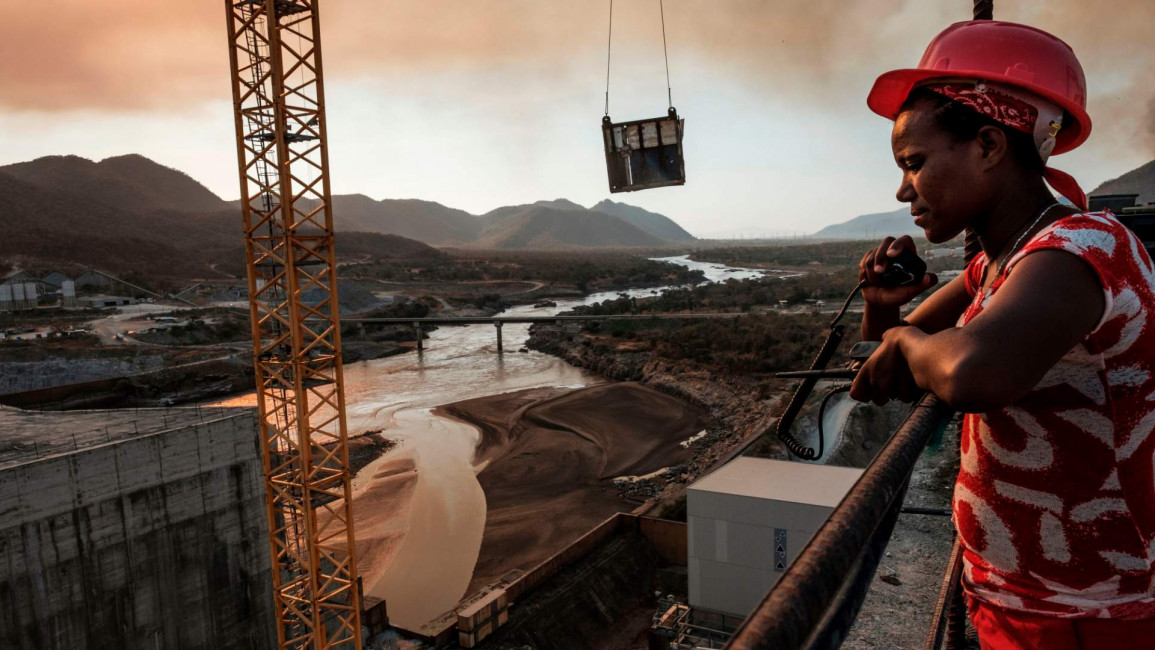
Ethiopia and Egypt weigh future of Nile and nationhood

After a decade-long dispute over Nile waters, Egypt and Ethiopia’s heads of state told the world last month that they will reach an agreement in under four months.
East Africa’s two largest nations have quarrelled vigorously over claims to the river since Ethiopia launched the Grand Ethiopian Renaissance Dam (GERD) in 2011, and a breakthrough agreement will define the futures of both countries.
Reaching a consensus between Ethiopia’s Abiy Ahmed and Egypt’s Abdel Fattah al-Sisi becomes ever more critical as the region is beset by geopolitical insecurity and the extreme impacts of climate change.
"For Egypt, it would be catastrophic for its water security if Ethiopia fills the dam without a legally binding agreement. It will lead to a situation where a conflict could break out any day"
Questions remain, however, over who will mediate the process, what will happen in the event of prolonged drought once Ethiopia fills the dam, and how Sudan can join the negotiating table.
“For Egypt, it would be catastrophic for its water security if Ethiopia fills the dam without a legally binding agreement. It will lead to a situation where a conflict could break out any day,” Sherif Mohyeldeen, a specialist on Egypt and regional cross-border issues, told The New Arab.
“An agreement is essential for peace and stability in all of Africa. It’s especially important for the Nile basin states to have a binding agreement between Ethiopia, Egypt, and also Sudan.”
In Cairo, Sisi has long argued that GERD threatens domestic water security and the very existence of its people, claiming that “no one can take a drop of water from Egypt” in response to the dispute.
“Egypt needs Nile water for its agricultural irrigation and domestic water, that's why a legally binding agreement is very important for Egypt, to be assured of the amount of water it receives at the right time”, Ashok Swain, UNESCO Chair on International Water Cooperation, explained to TNA.
In Addis Ababa, officials have long argued that the current water agreement, based on the colonial era Anglo-Egyptian treaty, disregards Ethiopian needs and clearly favours Sudan and Egypt.
Ethiopia did not consult Egypt when it started building GERD during the 2011 Egyptian revolution. The building of a dam is disallowed under the historic treaty, with Ethiopian officials arguing for sovereignty over their waters and the need to stem the flow of water to improve agriculture, reduce floods, and generate energy.
|
|
Why is it so critical?
Many Egyptians regard GERD as an existential threat to their existence, but Ethiopia and Egypt are both classified as states extremely vulnerable to climate change and their citizens face huge threats which any agreement must address.
Egypt is one of the world’s most drought-prone countries and relies on the Nile for 90% of its water supply, with 80% of the Egyptian Nile emerging from the Blue Nile in Ethiopia. Ethiopia also suffers extreme droughts, as well as flash floods and its severity of food insecurity is amongst the worst globally.
“The big question is what do you do if there are consecutive years of drought in the Nile Basin, and you have a real water shortage throughout the basin, like what we saw in the 1980s, that's where I think Egypt needs to be most concerned,” David Shinn, former US ambassador to Ethiopia and African Affairs professor at George Washington University, told TNA.
"An agreement is essential for peace and stability in all of Africa. It's especially important for the Nile basin states to have a binding agreement between Ethiopia, Egypt, and also Sudan"
With GERD 90% completed in April this year and likely to finish soon, there is concern in Cairo over how much water Ethiopia will release downstream and what will happen in instances where there is a serious drought.
Swain believes extreme events are increasingly likely, expediting the need for an agreement over the amount of water Ethiopia should release to avoid both climate devastation and conflict.
“Lake Nasser (Egypt) has adequate amounts of water reserves to compensate for a drought of a few years. The problem is when extreme climate change-related drought situations emerging in different parts of the world affect the region. If there is a long-term drought, Ethiopia must have an obligation to release a set amount of water.”
Impacts of an agreement
For Ethiopia, committing to an agreement with Egypt will help boost its international reputation following a series of human rights allegations in Tigray. The US is expected to lift sanctions on Ethiopia in the near future, paving the way for the nation to implement its economic recovery and secure a long-awaited loan from the IMF as well as an influx of Western aid.
Egypt is suffering its own economic crisis and needs to ensure domestic stability to attract international investors. An agreement will also provide water and food security, at a time when the world’s largest grain importer is navigating record-high food inflation costs and faces food uncertainty as a result of the Ukraine-Russia war.
For mutual neighbour Sudan, it remains uncertain how it will participate in the talks. Sudan has been more flexible in the past over its stance. It stands to receive inexpensive hydroelectric energy generated from the GERD project and like Egypt, benefits from the Anglo-Egyptian treaty.
Shinn believes that Sudan is not in a position to talk to anyone about any external matters and its stance is blurred by uncertainty over which side is winning the war.
“We have a pretty good idea where Burhan is coming from on it and he has a good relationship with Egypt and a relatively good one recently with Ethiopia. But he's not in a position at the moment to speak for the country, and he's very busy fighting a war. Who knows what Hemedti’s position on the water issue is?”
|
|
Likelihood of success
Despite the positive joint statement from Sisi and Ahmed’s meeting in Cairo last month, it is uncertain if a legally binding agreement will be inked.
“I'm a little sceptical that much is new or changed in the effort to resolve this problem. The negotiating table has been ongoing for many years,” Shinn said.
Previous negotiations between Sudan, Egypt and Ethiopia fell apart in April 2021 during talks in Kinshasa and all subsequent attempts to revive discussions have failed. Prior discussions in DC during the Trump era also collapsed after Ethiopia abandoned the talks.
Sheriff told TNA that “it has a lot of privileges for Egypt, and Sudan to stick to the old historical Colonial Era agreements. For Ethiopia, every time they abandon the plans and resort to the same narrative that it’s our land and we can build whatever we want”.
"Because there's such a long history of false starts, I would not hold my breath. But I would certainly encourage Ethiopia and Egypt to go forward with discussions"
There are also doubts over who is driving the talks, what direction they are going in, and what form any agreement will take.
“The statement made last month didn’t really provide any detail at all. It doesn't even indicate who is going to be their prime mediator or interlocutor. Will it be the African Union, as Ethiopia has insisted upon for a number of years or is it somebody else? Or are they doing it on their own, which is of course the possibility,” Shinn commented.
“Because there's such a long history of false starts, I would not hold my breath. But I would certainly encourage Ethiopia and Egypt to go forward with discussions.”
Lara Gibson is a Cairo-based journalist closely following Egypt's economic and political developments.
Follow her on Twitter: @lar_gibson




